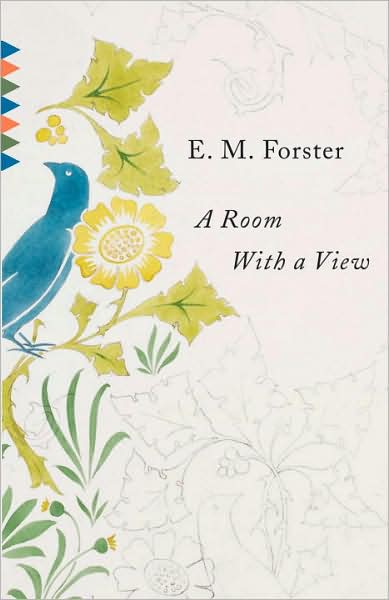 The contest lay not between love and duty. Perhaps there never was such a contest. It lay between the real and the pretended, and Lucy's first aim was to defeat herself.
The contest lay not between love and duty. Perhaps there never was such a contest. It lay between the real and the pretended, and Lucy's first aim was to defeat herself.I didn't intend it, but A Room with a View pairs nicely with The Ambassadors: Here are two books about people living conventional, oppressed lives who do not understand how stifling their existences are until they visit continental Europe. The actual nations and nationalities don't matter much--Paris isn't nearly so vital to Strether as Chad and his circle are, and for Lucy Honeychurch of A Room with a View, Florence isn't nearly so vital as the young man she meets, George Emerson, whose eccentricities make him both fascinating and a wildly inappropriate match.
Lucy is traveling with her elder cousin when she meets George at a pension house in Florence, where George and his father offer to trade rooms with them so that they can have a view of the river. It is a great kindness but also an impropriety which Forster exploits for great comedy. George continues to be there for Lucy when the "real" Italy threatens to overwhelm her--once, when she is stranded in the Cathedral of Santa Croce without her guidebook, and again when she witnesses a brutal murder in the Piazza Signoria. But when George, overcome with passion, kisses Lucy on a trip to Fiesole, she flees to Rome where she becomes engaged to a dull, critical buffoon named Cecil Vyse.
Forster originated the concept of "round" and "flat" characters and the number of strong, vibrant personalities is one of the most remarkable achievements of A Room with a View. Forster also has a knack for the perfect set-piece or minor detail:
She beheld the horrible fate that overtook three Papists--two he-babies and a she-baby--who began their career by sousing each other with the Holy Water, and then proceeded to the Machiavelli memorial, dripping but hallowed. Advancing towards it very slowly and from immense distances, they touched the stone with their fingers, with their handkerchiefs, with their heads, and then retreated. What could this mean? They did it again and again. Then Lucy realized that they had mistaken Machiavelli for some saint, hoping to acquire virtue. Punishment followed quickly. The smallest he-baby stumbled over one of the sepulchral slabs so much admired by Mr. Ruskin, and entangled his feet in the features of a recumbent bishop. Protestant as she was, Lucy darted forward.
I love this--Lucy's shallow distrust of Catholicism, the mordant humor of the children being blessed by Machiavelli, the silliness of the words "he-baby" and "she-baby." Forster slips through any number of literary modes with great success, from the satirical to the gothic:
Two Italians by the Loggia had been bickering about a debt. "Cinque lire," they had cried, "cinque lire!" They sparred at each other, and one of them was hit lightly on the chest. He frowned; he bent towards Lucy with a look of interest, as if he had an important message for her. He opened his lips to deliver it, and a stream of red came out between them and trickled down his unshaven chin.
And to the romantic:
He carried her to the window, so that she, too, saw all the view. They sank upon their knees, invisible from the road, they hoped, and began to whisper one another's names. Ah! it was worth while; it was the great joy that they had expected, and countless little joys of which they had never dreamt. They were silent.
In this manifold way Room stubbornly refuses, until we find out whether Lucy will ultimately leave Cecil for George, to commit to either comedy or a tragedy. Cecil is awful: pedantic and cynical, and dismissive of Lucy. But when she breaks off their engagement, he is suddenly and shockingly redeemed and humanized:
There was a pause. Then Cecil said with great emotion:
"It is true."
"True on the whole," she corrected, full of some vague shame.
"True, every word. It is a revelation. It is -- I... I'm not going to worry you. You are far too good to me. I shall never forget your insight; and dear, I only blame you for this: you might have warned me in the early stages, before you felt you wouldn't marry me, and so have given me a chance to improve. I have never known you till this evening."
Our hearts break quite unexpectedly for Cecil. It is sobering: happiness, Forster tells us, is possible for some but it is not possible for all. The novel's conflict is in Lucy, who must learn to be honest with herself about what she both wants and needs, but it is Cecil who is the casualty of this conflict. A Room with a View succeeds on the virtue of this element of honesty, when its final chapters could easily have become cloying or sentimental. It is nice to see that Lucy has come to know herself, and good to remember that not all who do so are happy with what they find.

No comments:
Post a Comment